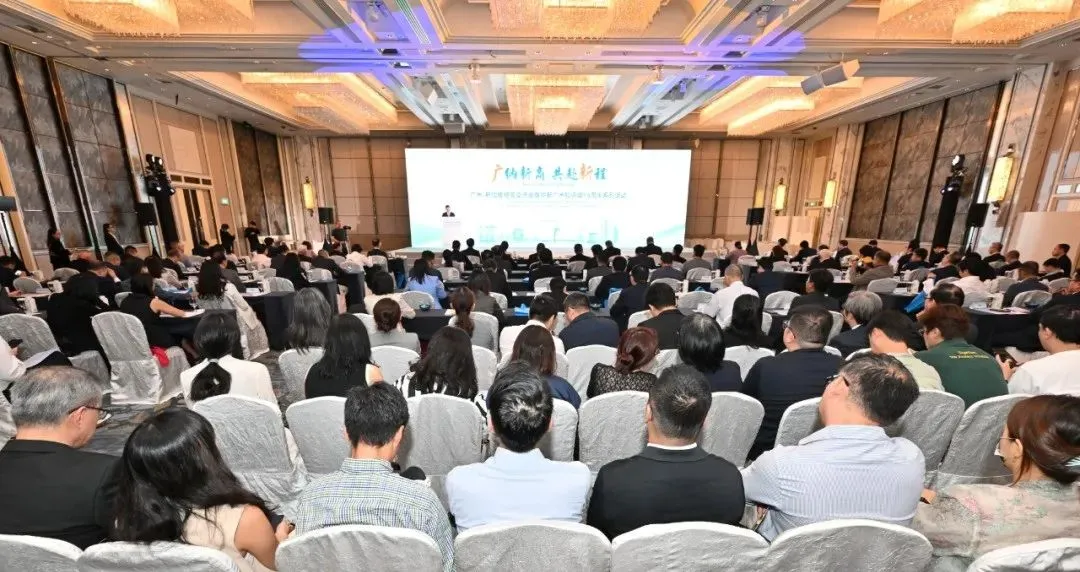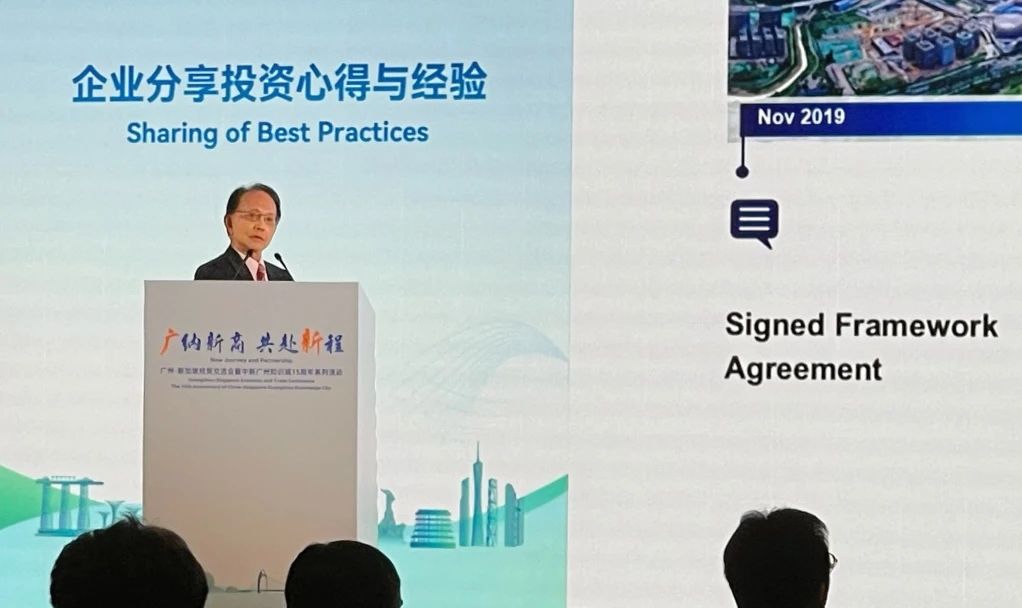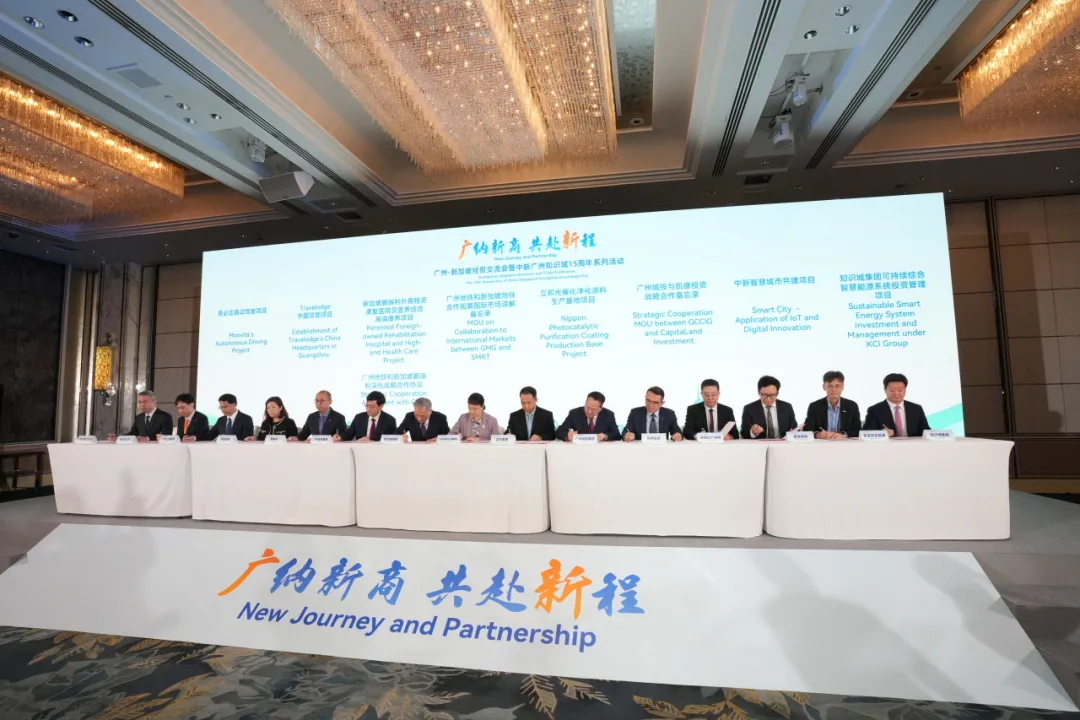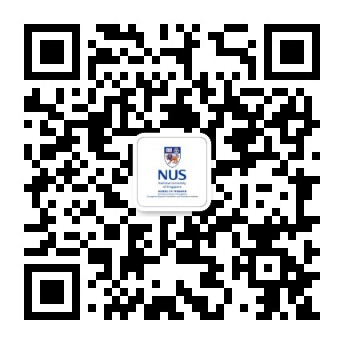On April 2, 2025, the Guangzhou-Singapore Economic and Trade Conference and the 15th Anniversary of China-Singapore Guangzhou Knowledge City, under the theme “New Journey and Partnership”, was successfully held in Singapore. Hosted by the People’s Government of Guangzhou Municipality and supported by Enterprise Singapore and the Singapore Chinese Chamber of Commerce & Industry (SCCCI), the event was attended and addressed by Cao Zhongming, Chinese Ambassador to Singapore; Sun Zhiyang, Mayor of Guangzhou; as well as representatives from Enterprise Singapore, Canton Investment Development Commission (CIDC), and SCCCI. Professor Hang Chang Chieh, Emeritus Deputy President of NUS and President Advisor of NUS Guangzhou Research Translation and Innovation Institute, was also invited to deliver a speech. More than 100 representatives from Singaporean enterprises, universities, institutions, and business associations, including NUS, SMRT Corporation, CapitaLand Investment, and HSBC Singapore, participated in the event. These participants represented diverse sectors such as biomedicine, high-end wellness, the marine economy, and urban construction. The event facilitated the signing of 13 projects with a total investment of 2 billion yuan, including smart city projects introduced by NUS Guangzhou Research Translation and Innovation Institute (NUS GRTII).

Gathering Talents and Wisdom, Riding the Momentum Together——Professor Hang Chang Chieh Maps Out a Blueprint for NUS GRTII
During the event, Professor Hang Chang Chieh delivered a speech. He introduced the major achievements, latest progress, and future work plans of the Institute since its establishment over a year ago. He also expressed his heartfelt gratitude to Guangzhou and Huangpu District for their strong support for the Institute.

According to Professor Hang, the Institute will leverage NUS’s world-class research strengths and resources and focus on seven key areas: smart cities, information and communication, electronic technology, advanced manufacturing, artificial intelligence applications, bioscience, and fintech. In alignment with the industrial needs of the Guangdong-Hong Kong-Macao Greater Bay Area (GBA), NUS GRTII aims to facilitate the commercialization of international technological innovations and industrial transformation and upgrading, while also enabling the two-way flow of talent, technology, and startups between Singapore and Guangdong. “The Institute serves as not only a bridge for technology transfer but also a hub for talent exchange and industrial collaboration between China and Singapore,” he emphasized.
Guangzhou-Singapore Cooperation for Win-Win Success in the GBA Introduction to the projects signed by NUS GRTII
In his speech, Mayor Sun Zhiyang emphasized that Guangzhou-Singapore cooperation is entering a new stage of “two-way empowerment” and that urban renewal and smart governance are key areas for deeper cooperation between the two sides. “We hope Singaporean enterprises actively share their successful experience in urban renewal, city construction, and the development and utilization of above-ground and underground spaces with Guangzhou, and jointly explore new paradigm for smart city governance cooperation,” he said.
Advancing the “Guangzhou-Singapore two-way empowerment” is one of the strategic missions of the Institute. During this event, the Institute signed a cooperation agreement with Softgrid Sensing, a high-tech company from Singapore. As a key technology partner of the Singapore Housing & Development Board (HDB), Softgrid Sensing utilizes IoT and cloud computing to monitor and manage over 20,000 elevators for HDB and private apartments. Leveraging the ecological network and solid technological foundation of NUS GRTII in the Greater Bay Area, the company will focus on the critical area of intelligent urban infrastructure and empower Guangzhou’s smart city construction with AI-powered elevator safety monitoring. Currently, Softgrid Sensing is discussing with Guangzhou Affordable Housing Group the deployment of IoT smart sensing terminals and data hub systems for affordable housing in Guangzhou and actively accelerating the implementation of the cooperation project. Furthermore, NUS GRTII will cooperate with Softgrid Sensing to build an exchange platform between Singapore and Guangzhou in the field of smart city construction, aiming to provide Singaporean smart solutions for building Guangzhou into a more livable city.

With its open stance, the GBA has developed into a hub for global cooperation. The China-Singapore Guangzhou Knowledge City began development 15 years ago and has since witnessed the fruitful results of smart cooperation between both countries. Driven by the three engines of scientific research, talent development, and innovation, NUS GRTII will remain committed to advancing the industry-university-research-application integration and commercialization of scientific and technological achievements. With technology and talent at the forefront, the Institute will unite forces of the GBA and the world and set a benchmark of “two-way empowerment” for businesses and talents in both Guangzhou and Singapore.


